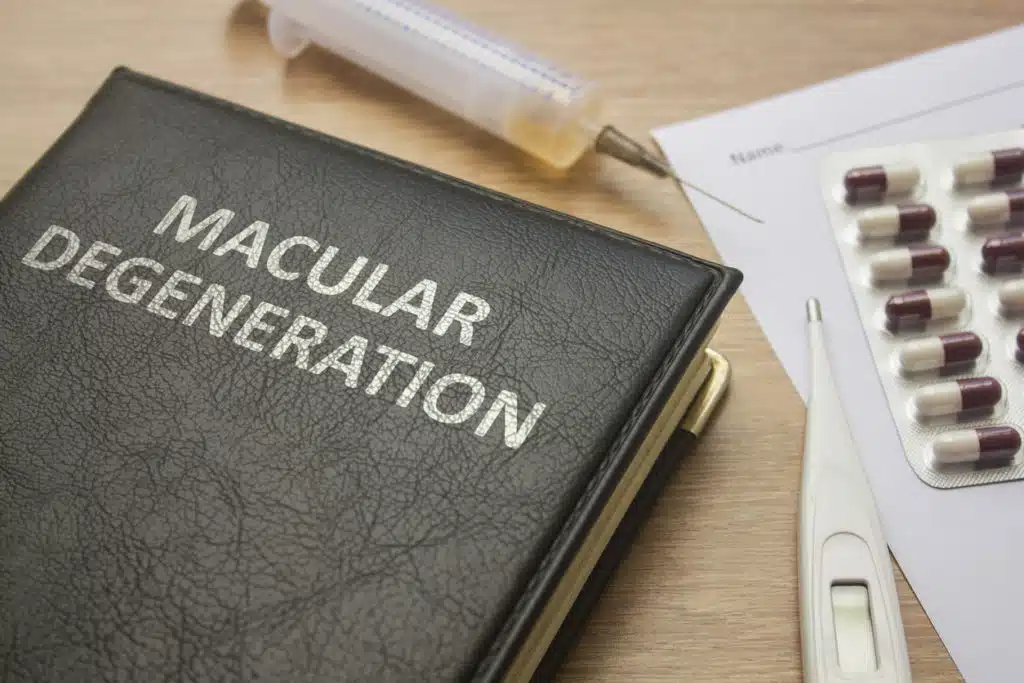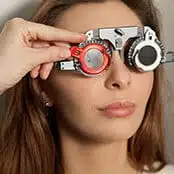
Age-related macular degeneration is one of the leading causes of vision loss in people over 50 years old. This eye disease affects the macula, the back part of the retina controlling central vision. The macula is responsible for sending images from the optic nerve to the brain. Damage to the macula causes a blurry or wavy central vision.
Age-related macular degeneration is classified into two subtypes: nonexudative (dry) and (exudative) wet. Dry AMD is more common, accounting for about 80 percent of cases. It occurs when light-sensitive cells in the macula gradually break down. On the other hand, the less-common wet AMD usually results in severe and rapid vision loss. The wet type of AMD is caused by the growth of abnormal blood vessels beneath the retina, thereby leaking fluid or blood. In some cases, dry AMD can lead to wet AMD.
AMD has no known cause. Apart from advancing age, smoking, obesity, and cardiovascular disease are known risk factors for AMD.
Let’s learn about how to prevent and treat AMD and where to seek high-quality eye care in Washington and Missouri.
Prevention for Age-Related Macular Degeneration
The best way to prevent age-related macular degeneration is to have routine eye exams. AMD often develops with little to no symptoms. Your eye doctor can help you detect early signs of the disease by running a comprehensive test.
The Amsler grid test is a straightforward vision test, in which you will be instructed to identify whether the lines or sections appear wavy or distorted or whether the visual field is missing. Both are indicative of AMD.
A dilated eye exam allows your doctor to look inside your eyes. They will put eye drops to widen your pupils and use a special lens to examine your retina. If they suspect you may have wet AMD, your doctor will perform a fluorescein angiography, which checks for any leakages under the macula. During this procedure, your eye doctor will inject a special dye into a vein in your arm, then use a special camera to track the dye as it travels through the blood vessels in your eye.
In addition to getting regular eye exams, you can prevent AMD by making positive lifestyle changes. Quit smoking, maintain a balanced diet, and do regular physical activity. These are instrumental in the prevention of not only AMD but a wide range of other eye problems, such as cataracts and glaucoma.
Treatment for Age-Related Macular Degeneration
There is no known cure for age-related macular degeneration. Treatment can only slow the disease progression and provide symptom relief; therefore, there is no guarantee that the symptoms will not return.
Your treatment would depend on which type of AMD you’re diagnosed with. Maintaining a healthy diet rich in antioxidants can help slow the progression of dry AMD. Your doctor may prescribe vitamin C, vitamin E, lutein, zinc, copper, and beta carotene supplements.
If you have wet AMD, you likely have abnormally high levels of vascular endothelial growth factors (VEGF) inside your eyes. VEGF is a signaling protein that is responsible for promoting the growth of new blood vessels.
To slow the formation of fragile blood vessels, your doctor may recommend anti-VEGF injections, which are administered directly into your eye. Your doctor may combine anti-VEGF with photodynamic therapy, in which they will use both a laser and injectable light-sensitive drug to destroy the abnormal blood vessels in your eye/s. Your eye doctor may also recommend wearing vision aids to help with your day-to-day activities. Your doctor may also advise that you use brighter lights at home and read with a magnifying device to reduce the pressure in your eyes.
High-Quality Eye Care in Washington, MO
Although age-related macular degeneration does not typically result in complete blindness, it can impair your direct line of sight and make you dependent on your peripheral vision. This can render you unable to perform your day-to-day activities and significantly affect your quality of life. Early detection of AMD through regular eye exams can make a big difference.
If you want to take proactive measures to protect your eyesight, schedule an eye exam with us at Advanced Sight Center. Our board-certified eye experts are dedicated to providing comprehensive, high-quality eye care to patients in the Washington and areas in Missouri. Your ophthalmologist will do a thorough evaluation and, after confirming a diagnosis, will craft a treatment plan that best suits your needs.
To schedule an appointment, call our Washington office at (636) 239-1650. You can also fill out our online appointment request form. We look forward to serving you.



